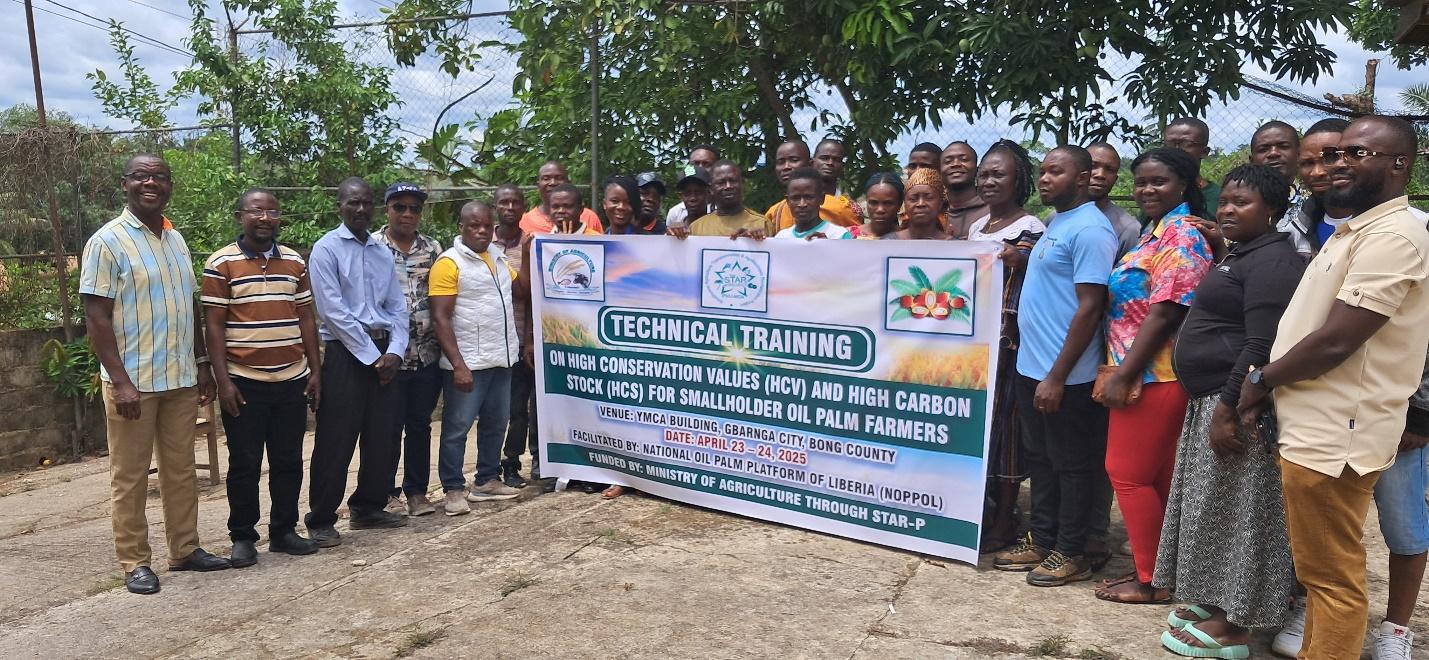Africa-Press – Liberia. Thirty smallholder oil palm farmers from Bong, Lofa, and Nimba Counties have completed a two-day technical training focused on biodiversity conservation, hosted by the National Oil Palm Platform of Liberia (NOPPOL) in partnership with the STAR-P Project.
The training, held from April 23 to 24 at the SERENGETI Multipurpose Center in Gbarnga, aimed to equip farmers with knowledge and tools to adopt sustainable farming techniques based on High Conservation Value (HCV) and High Carbon Stock (HCS) principles — key pillars of environmentally responsible agriculture.
The initiative forms part of Objective 7 of the National Oil Palm Strategy and Action Plan (NOPSAP), which promotes sustainable land use practices across Liberia’s growing agricultural sector.
James M.V. Yougie, Communication Specialist at NOPPOL, underscored the importance of aligning farming with conservation. “This training is a key step in ensuring that oil palm farming in Liberia is not only productive but also environmentally responsible,” he stated.
Farmers engaged in practical sessions on identifying and preserving high-value conservation areas and learned the importance of protecting carbon-rich zones to help mitigate climate change and prevent deforestation.
Lead facilitator Wynston Benda-Henries encouraged farmers to view themselves not only as producers but also as stewards of the environment. “Conservation must be integrated into our development goals. Farmers need to lead this effort at the grassroots level,” he said.
Participants were introduced to the HCS+ framework — a comprehensive model combining environmental, social, and economic sustainability. Discussions emphasized the need to assess land history, involve communities in planning, and avoid farming on sacred or ecologically sensitive land.
Among the participants was James K. Togbah of Meni-nei Farmers Incorporated, who said the training opened his eyes to the importance of understanding land ownership and its historical and cultural significance before establishing farms.
He stressed the need to engage communities in discussions about land use and to avoid cultivating on lands with unclear or sacred backgrounds.
Nicholas Martor, a farmer from Yarntana Town in Panta District, Bong County, expressed that he had previously not considered the need to research the history of land before farming. He now understands that some areas — especially sacred or traditionally valued lands — must be preserved and not used for cultivation.
Benjamin Y. Dorborson of Zealand Town in Zorzor District, Lofa County, said the training gave him a new perspective on land management. He learned how to identify High Conservation Value areas, which he described as ecosystems where economically important wildlife species live. He emphasized that these areas should be protected for both environmental and economic reasons.
NOPPOL, a multi-stakeholder platform, continues to play a pivotal role in shaping Liberia’s oil palm sector through strategic initiatives like NOPSAP, aimed at fostering development that supports both farmer livelihoods and environmental protection.
For More News And Analysis About Liberia Follow Africa-Press






